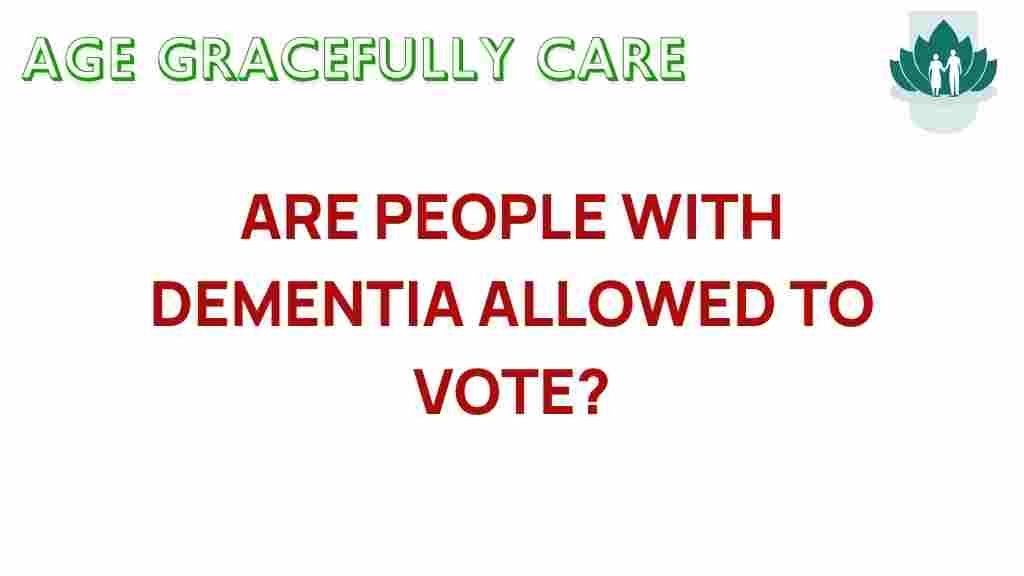Can Individuals with Dementia Exercise Their Right to Vote?
As society increasingly recognizes the importance of civic engagement, the question of whether individuals with dementia can exercise their voting rights has become a significant topic of discussion. Voting is a fundamental democratic right, yet many people with mental health challenges, including dementia, face barriers that may prevent them from participating in elections. This article explores the intersection of dementia, voting rights, legal capacity, and advocacy, providing insights into how individuals living with dementia can navigate the voting process.
Understanding Dementia and Voting Rights
Dementia is a broad term that encompasses various conditions affecting cognitive function, memory, and the ability to carry out daily activities. Individuals with dementia may experience difficulties in decision-making and understanding, which raises concerns about their legal capacity to vote. However, the right to vote is not solely dependent on cognitive ability; it is also a matter of legal and civil rights.
- Legal Capacity: The legal framework regarding voting rights varies by jurisdiction. In many places, individuals with dementia retain their legal capacity to vote unless a court determines otherwise.
- Disability Rights: Voting rights for individuals with disabilities, including those with dementia, are protected under various laws, such as the Americans with Disabilities Act (ADA) and the Help America Vote Act (HAVA).
- Civic Engagement: Encouraging civic engagement among individuals with dementia is crucial for fostering a sense of community and belonging.
Step-by-Step Process for Voting with Dementia
For individuals with dementia, the voting process may require additional support. Here’s a step-by-step guide to help navigate the voting process effectively:
1. Check Registration Status
Before the elections, it is essential to ensure that the individual is registered to vote. This can typically be done online through the state election office’s website.
2. Understand Voting Options
Depending on the individual’s capabilities and preferences, there are various voting methods available:
- In-Person Voting: This traditional method allows individuals to vote at their designated polling place.
- Absentee Voting: Individuals who may have difficulty traveling to a polling place can request an absentee ballot to vote by mail.
- Accessible Voting Machines: Polling places are required to provide accessible voting machines that cater to individuals with disabilities.
3. Plan for Support
Individuals with dementia may benefit from having a trusted family member or friend accompany them to the polls. This support can help them feel more comfortable and confident during the voting process.
4. Review the Ballot Together
Before voting, reviewing the ballot with the individual can help them understand their choices. This can include discussing candidates and issues in a simplified manner.
5. Vote
On the day of the election, ensure that the individual has everything they need to vote, such as identification (if required) and any necessary assistance with understanding the ballot.
Troubleshooting Voting Issues for Individuals with Dementia
While the voting process is designed to be accessible, challenges can still arise. Here are some common issues and troubleshooting tips:
Issue 1: Confusion at the Polls
Individuals with dementia may become confused or anxious in crowded or noisy environments. To mitigate this:
- Visit the polling place during less busy hours.
- Familiarize the individual with the polling location ahead of time.
Issue 2: Difficulty Understanding the Ballot
If the individual struggles to understand the ballot, consider:
- Using clear and simple language when explaining the choices.
- Taking breaks if the individual feels overwhelmed.
Issue 3: Challenges with Accessibility
If accessibility is a concern, ensure that:
- The polling place complies with ADA requirements.
- There are provisions for curbside voting if necessary.
Advocacy for Voting Rights
Advocacy plays a vital role in ensuring that individuals with dementia can exercise their voting rights. Here are some ways to support this cause:
- Educate Others: Raise awareness about the importance of voting rights for individuals with dementia and other disabilities.
- Engage with Local Organizations: Collaborate with organizations focused on disability rights and mental health to promote accessible voting.
- Legislative Advocacy: Support policies that protect and enhance the voting rights of individuals with disabilities.
- Provide Resources: Share information about how individuals can register to vote and access resources related to the voting process.
Conclusion
Individuals with dementia have the right to participate in elections and exercise their voting rights. While challenges may exist, understanding legal capacity, available resources, and the voting process can empower individuals and their families to engage in civic life. By advocating for disability rights and promoting accessibility, we can ensure that everyone, regardless of their mental health status, has a voice in shaping their community and society.
For more information on voting rights and resources for individuals with disabilities, visit the National Association of Secretaries of State website.
If you want to learn more about advocacy for individuals with dementia and how to support their voting rights, check out our resources page.
This article is in the category Resources and created by AgeGracefullyCare Team
